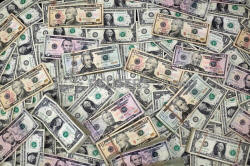Dollar rally fizzles despite retail-trading jitters, yen falls sharply
 Send a link to a friend
Send a link to a friend
 [January 29, 2021] By
Tommy Wilkes [January 29, 2021] By
Tommy Wilkes
LONDON (Reuters) - The dollar's rally
fizzled on Friday and risk-sensitive currencies recovered as nervousness
about an assault on hedge-fund equity short positions in the United
States eased in foreign exchange markets, while the yen dropped sharply.
The moves in FX markets were measured but the earlier buying of dollars
underscored that concerns about the wild swings in stock prices had
worried traders in currency markets.
The big mover of the day was the Japanese yen, which hit a two-week low
versus the dollar and a nearly three-year low against the Swiss franc.
Analysts attributed the move to several reasons, including the dollar's
yield advantage over Japan and month-end portfolio reshuffling.
The dollar had benefited from safety buying since the start of the week,
when investors fretted that President Joe Biden's fiscal spending
package would not be as large as the proposed $1.9 trillion.

COVID-19 vaccine rollouts globally have been running into trouble, too,
adding to investor jitters. Production delays have snowballed into a
spat between the European Union and drugmakers over how best to direct
the limited supplies available.
The dollar index -- which measures the dollar against a basket of
currencies -- initially rose but was last down slightly at 90.526 . It
remains up for the week and is nearly 0.9% higher this month.
Against the yen the dollar rallied as much as 0.6% to 104.94, its
strongest since Nov. 16.
The yen also weakened sharply versus the Swiss franc and the euro.
"It's a very interesting move especially given that at the same time
global equity indices would suggest that risk sentiment is not improving
as much to justify the move," said Valentin Marinov, head of G10 FX
research at Credit Agricole, referring to the yen's drop versus the
dollar.
[to top of second column] |

U.S. Dollar banknotes
are seen in this photo illustration taken February 12, 2018.
REUTERS/Jose Luis Gonzalez/Illustration

The Japanese currency typically rises when investors are nervous, and shares
fell heavily on Friday amid the long-short battle in U.S. stock markets.
"It also highlights that the primary driver of that could be the growing yield
advantage of the dollar over low yielding currencies like the yen, the Swiss
franc," Marinov added.
The euro rose 0.1% to $1.2137, rebounding after growth in Germany and Spain and
a smaller-than-expected contraction in France pointed to resilience in the euro
zone economy.
Risk-sensitive currencies like the Australian dollar fell but were off their
lows of the day. Most emerging-market currencies dropped.
The Chinese yuan, however, strengthened 0.4% to 6.45 yuan per dollar in offshore
markets.
The People's Bank of China injected 100 billion yuan into the financial system
on Friday following a week of reducing liquidity, which had sparked concerns it
was in fact tightening monetary policy. [L1N2K404V]
Despite the dollar's move higher this month, most analysts believe it will
weaken in 2021 as the new U.S. government implements massive fiscal spending
while the Federal Reserve maintains its ultra-easy monetary policy.
ING analysts said that "the recent reiteration by the Fed of its ultra-dovish
stance despite an improving outlook leaves the dollar vulnerable in the
medium-term as risk sentiment stabilizes."
(Additional reporting by Ritvik Carvalho; editing by Larry King and Philippa
Fletcher)
[© 2021 Thomson Reuters. All rights
reserved.] Copyright 2021 Reuters. All rights reserved. This material may not be published,
broadcast, rewritten or redistributed.
Thompson Reuters is solely responsible for this content. |